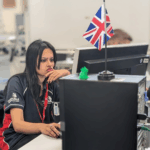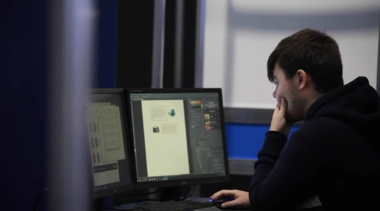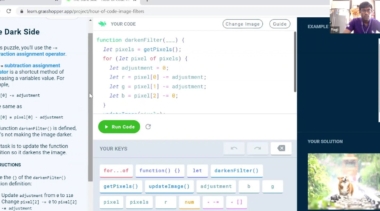Lewis is part of the Squad UK Web Design team. He explains how being able to access world-class training and support has boosted his confidence and given him the skills he needs to succeed in his career.
For many years, Lewis Newton found himself struggling to decide what he wanted to do with his life. “I felt a constant pressure to go through the traditional route of GCSEs, then A Levels, and finally university, although I had no idea of what I wanted to do. It was only when I explored web development in my own time that I found myself loving the field, which led me to my dream career.”
Deciding to complete a BTEC Level 3 Extended Diploma in IT Lewis took his first independent steps towards his future. “I felt like this was the best route for me to take. Focusing on IT, and more specifically software development, enabled me to gain technical experience through client-oriented briefs, and gave me a much better focus.”
Lewis was inspired by hearing from previous college students who had gone on to have successful careers in software development. “They also shared their fantastic life-changing experiences from their own journeys representing the college at the National Finals at WorldSkills UK LIVE, and the UK at the EuroSkills and WorldSkills international competitions. This gave me the courage and motivation to try competing myself.”
He first competed in the National Qualifiers at Highbury College in 2017 and went on to compete in the National Finals held as part of WorldSkills UK at the NEC Birmingham in front of thousands of spectators, later that year. His determination and drive as well as his technical skills earned him a coveted Gold Medal.
“My favourite part about taking part in the competitions is the confidence boost. I was reluctant at first to compete in the National Qualifier, with my low self-esteem I didn’t think I would even come close to qualifying for the National Final. I felt so lucky to have won my Gold Medal. Since then, I’ve been able to believe in myself more and not be afraid to try new things, even when I know they are outside my comfort zone.
“The first time I competed was also the first time I had pushed myself beyond what I thought I was capable of, and the hard work paid off hugely for me.
“The experience has taught me that change is not something to be afraid of; instead, it is something we should embrace so that we can take more opportunities like these. It genuinely has been a life-changing journey.”
Lewis feels competing has benefited him outside of the arena too. “It’s given me the edge I needed to go the extra mile in both my career and studies. In my profession, I feel like there is only a certain amount of content that can be taught in the classroom, so pushing myself further has enabled me to learn so much more. I now also feel more comfortable performing under pressure, which is essential for assessments and busy periods in the workplace. I feel more well-rounded now having had the chance to explore different areas of my skill that were not in the college syllabus.”
Having been selected as a member of Squad UK Lewis is undergoing the intensive skill set and mindset training programme that is unique to WorldSkills UK and will prepare him for the possibility of selection to Team UK and the chance to represent his country on the international stage.
“Being able to access world-class training and support inside and outside my skill area has enabled me to learn so much more about how I can better myself, not only in my technical experience but also in other areas that are key for securing my dream career.”
As for many people the COVID-19 pandemic has had its impact on Lewis’s plans. “It has completely changed my everyday life and shifted me towards a new style of working. I am lucky that in my profession I can use technology to help support my work and stay connected outside the workplace while we adapt to and continue fighting against this virus.”
Asked how he would like to see technical education and career pathways treated Lewis says, “Ideally, I believe educators, parents, and governments should encourage all forms of education and be more inclusive of options other than GCSEs, A Levels, and degree programmes, as not every career path is going to be the same. End goals should take precedence over general education alone to give students a better chance of aiming for their dream careers.”





